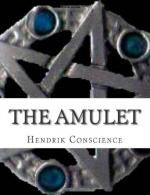There was a striking resemblance between the creation of the artist and the young girl seated beneath in almost the same attitude. In truth, the youthful Mary Van de Werve was as beautiful as the poetical representation of her patroness. She had the same large blue eyes, whose expression, although calm and thoughtful, revealed a keen sensibility and a tender, loving soul; her golden hair fell in ringlets over a brow of marble whiteness, and no painter had ever traced a cheek of lovelier mould or more delicate hue; her whole being expressed that calm recollection and attractive gravity which is the true poetry of the immaterial soul, and which was comprehended only by the believing artists of the North before the material inspiration of pagan art had been transmitted to them from the South.
Mary Van de Werve was most richly attired; but there was in her dress an absence of ornament which appeared strange at that period of extreme pomp and show. A waist of sky-blue velvet encircled her slender form, and a brocade skirt fell in large folds to her feet. Only on her open sleeves appeared some gold thread, and the clasp which fastened the chamois-skin purse suspended from her girdle was encrusted with precious stones.
All her surroundings betokened her father’s opulence: large stained-glass windows, covered with the armorial bearings of his ancestors, cast their varied hues upon the inlaid marble floor; tables and chairs of oak, slabs supporting exquisite statuary from the chisel of the most celebrated artists, were ranged along the walls; an ivory crucifix surmounted a silver basin of rare workmanship containing holy water. Even the massive andirons, which stood in the broad fireplace, were partly of gold and ornamented with the coat of arms.
Her prayer was finished, or it might be that her thoughts had taken another turn; she arose and walked slowly towards the large window which overlooked the garden. She fixed her eyes upon the beautiful blue sky; her countenance was bright, as though a sweet hope filled her heart, and a rosy hue suffused her cheeks.
An old man at this moment entered the room. Heavy moustaches shaded his lips, and a long beard fell upon his breast. There was something grave and severe in his imposing appearance and even in his dress; for although his doublet was of gold cloth, his whole body was enveloped in a long cloak, whose dark color was relieved by a lining of white fur.
“Good morning, Mary,” he said, as he approached the young girl.
“May the blessing of God always be with you, dear father,” she replied. “Come, see how lovely the sky is, and how brightly the sun shines.”
“It is charming weather; we might almost imagine ourselves in the month of May.”
“It is the eve of May, father.” And with a joyous smile she drew her father to the window, and pointing to the sky, said: “The wind has changed; it blows from the direction of England.”




